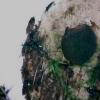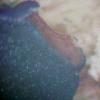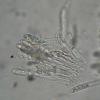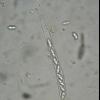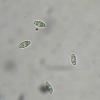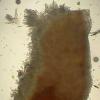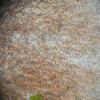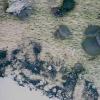
29-11-2024 21:47
Yanick BOULANGERBonjourJ'avais un deuxième échantillon moins mat

27-02-2026 17:51
 Michel Hairaud
Michel Hairaud
Bonjour, Quelqu'un peut il me donner un conseil p

27-02-2026 16:17
 Mathias Hass
Mathias Hass
Hi, Found this on Betula, rather fresh fallen twi

27-02-2026 12:56
Åge OterhalsFound on fallen cones of Pinus sylvestris in midle

27-02-2026 11:21
 Yannick Mourgues
Yannick Mourgues
Hi to all. Here is a specie that can may be relat

26-02-2026 15:00
Me mandan el material seco de Galicia, recolectada

24-02-2026 11:01
Gernot FriebesHi,found on a branch of Tilia, with conidia measur

23-02-2026 11:22
Thomas Læssøehttps://svampe.databasen.org/observations/10584971
asco with orange flesh
Ismael Wind,
30-10-2011 23:17
I'm having trouble identifying this asco. It grows on larix wood. It looks very typical, green outside and with orange flesh... Unfortunally i cannot find what it may be... I suspect its an hymenoscyphus or an mollisia
Spores: 12 * 5 ; asci: 112 * 5 : parafysen: app 100 somewhat swollen at the top
sometimes it seems to be stalked a bit especially when young
Neven Matocec,
31-10-2011 09:04

Re : asco with orange flesh
Hello Wind I,
At the first glance it might be something very similar (perhaps another species of the same genus) to one of our recent collections originated from Picea abies virgin forest (Encoelioid group of Sclerotiniaceae) that we work very intensively onto. We also still don't have a name for our collection.
Would it be possible to send us single mature and intact apothecium attached to a part of the substrate, preferably in living (fresh) state to analyse it more closely? We will send our opinion immediatelly after treatment!
Cheers,
Neven
At the first glance it might be something very similar (perhaps another species of the same genus) to one of our recent collections originated from Picea abies virgin forest (Encoelioid group of Sclerotiniaceae) that we work very intensively onto. We also still don't have a name for our collection.
Would it be possible to send us single mature and intact apothecium attached to a part of the substrate, preferably in living (fresh) state to analyse it more closely? We will send our opinion immediatelly after treatment!
Cheers,
Neven
Ismael Wind,
31-10-2011 12:01
Re : asco with orange flesh
Hello Neven,
ok that is no problem. I already have youre adres via Stip Helleman.
I'm very curious what it might be!!
greetings Ismael
ok that is no problem. I already have youre adres via Stip Helleman.
I'm very curious what it might be!!
greetings Ismael
Neven Matocec,
31-10-2011 20:05

Re : asco with orange flesh
Hi Ismael,
Superb!
Yes, do I! Let's hope that shipment will arive safely. Thank you.
Cheers,
Neven
Superb!
Yes, do I! Let's hope that shipment will arive safely. Thank you.
Cheers,
Neven
Ismael Wind,
01-11-2011 22:46
Re : asco with orange flesh
o yes before i forget under the microscope when stamped a little the green part easily separates from the orange part. In a very sharp line, might be an important feature
Neven Matocec,
02-11-2011 00:14

Re : asco with orange flesh
Okay! Sounds interesting and indeed might be important. That may tell us about sharp differentiation between texture layer structures and/or consistency. We did not observe in our material. In ours, orange was not entire flesh (on section) but we detected rusty-orange ectochroic granular pigment in ectal exciple only.
Not to forget (in case if you still did not sent the apothecium), it would be important to put the material attached to a part of the substrate in just a little bigger plastic box (to prevent mechanical damage) among small portion of lightly moistened moss (to keep the atmosphere humid enough inside the box) and to place dried fallen leaf, preferably Fagalean on the top of the apothecium (to ensure the hymenium will not undergo in deterioration / apressed to the lid surface).
Thanks again!
N.
Not to forget (in case if you still did not sent the apothecium), it would be important to put the material attached to a part of the substrate in just a little bigger plastic box (to prevent mechanical damage) among small portion of lightly moistened moss (to keep the atmosphere humid enough inside the box) and to place dried fallen leaf, preferably Fagalean on the top of the apothecium (to ensure the hymenium will not undergo in deterioration / apressed to the lid surface).
Thanks again!
N.
Martin Bemmann,
02-11-2011 12:10

Re : asco with orange flesh
Hi Ismael and Neven,
this fungus reminds me somewhat on a Pachyella by morphology, spores etc. Are the asci operculate?
Regards
Martin
this fungus reminds me somewhat on a Pachyella by morphology, spores etc. Are the asci operculate?
Regards
Martin
Ismael Wind,
02-11-2011 18:58
Re : asco with orange flesh
Hello Martin,
i've looked at that genus, but the sporesize does not match. Unless there's one with smaller size that i can not find?
i've looked at that genus, but the sporesize does not match. Unless there's one with smaller size that i can not find?
Martin Bemmann,
02-11-2011 19:16

Re : asco with orange flesh
Hi
this was/is just a guess or a dead end road ;-) ...
first of all I would check the ascus-type. Did you observe them in Lugol (Jodine)? To know if they are operculate or inoperculate is a major step in determination. My suspicion is operculate.
When you cut the hymenium, is the inner part orange from the beginning or is it a liquid that turns yellowish-orange after some time (maybe seconds)? In the case of Pachyella pseudosuccosa it turns into such a colour (just as an example).
Regards
Martin
this was/is just a guess or a dead end road ;-) ...
first of all I would check the ascus-type. Did you observe them in Lugol (Jodine)? To know if they are operculate or inoperculate is a major step in determination. My suspicion is operculate.
When you cut the hymenium, is the inner part orange from the beginning or is it a liquid that turns yellowish-orange after some time (maybe seconds)? In the case of Pachyella pseudosuccosa it turns into such a colour (just as an example).
Regards
Martin
Neven Matocec,
03-11-2011 00:35

Re : asco with orange flesh
Hello Ismael & Martin,
Hmmm...indeed hymenial elements are too small for Pachyelloid fungi I personally know. So, how big are apothecia? Is habitat clearly hydrophilous? I still think it is inoperculate. We have this Encoelioid fungus from Picea on forest terrace with almost identical asci and spores. Anyway, I'd like to make further comments after we look at it :-)
Cheers,
Neven
Hmmm...indeed hymenial elements are too small for Pachyelloid fungi I personally know. So, how big are apothecia? Is habitat clearly hydrophilous? I still think it is inoperculate. We have this Encoelioid fungus from Picea on forest terrace with almost identical asci and spores. Anyway, I'd like to make further comments after we look at it :-)
Cheers,
Neven
Ismael Wind,
03-11-2011 21:22
Re : asco with orange flesh
The frb is approx 0.5-1cm i think somewhat smaller than the size of a Scutellinia scutellata?. The habitat is not distinctively wet. As far as i remember but well moist i suppose, there was growth of sphagnum but this was somewhat further away... The branch itself was wet. Also it was not very rotten but still very firm
